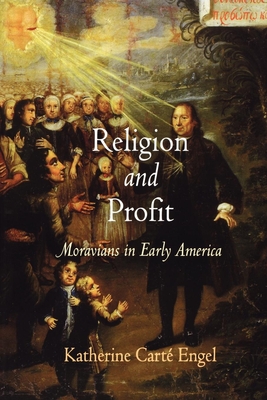Religion and Profit Moravians in Early America Katherine Carté Engel Winner of the 2010 Dale W. Brown Book Award for Outstanding Scholarship in Anabaptist and Pietist Studies "Ambitious and deeply researched. . . . An ideal example of a case study with far broader implications for American religious history."--Church History "Engel's account of change over the last part of the century features careful attention to the interplay of local and world events, the continuing integrity of Moravian religious motives, but also the compelling force of circumstances that ended the earlier dynamism of this pilgrim community. . . . A noteworthy example of Atlantic history at its best."--Catholic Historical Review "Engel fills a significant gap in the history of the Moravian Brethren in America by focusing on the connection between their spiritual ideal and economic activity. In doing so, she also spotlights the significance of transatlantic ties and the impact of the Seven Years War for the entire middle Atlantic region."--Journal of American History The Moravians, a Protestant sect founded in 1727 by Count Nikolaus Ludwig von Zinzendorf and based in Germany, were key players in the rise of international evangelicalism. In 1741, after planting communities on the frontiers of empires throughout the Atlantic world, they settled the communitarian enclave of Bethlehem, Pennsylvania, in order to spread the Gospel to thousands of nearby colonists and Native Americans. In time, the Moravians became some of early America's most successful missionaries. Such vast projects demanded vast sums. Bethlehem's Moravians supported their work through financial savvy and an efficient brand of communalism. Moravian commercial networks, stretching from the Pennsylvania backcountry to Europe's financial capitals, also facilitated their efforts. Missionary outreach and commerce went hand in hand for this group, making it impossible to understand the Moravians' religious work without appreciating their sophisticated economic practices as well. Of course, making money in a manner that be fitted a Christian organization required considerable effort, but it was a balancing act that Moravian leaders embraced with vigor. Religion and Profit traces the Moravians' evolving mission projects, their strategies for supporting those missions, and their gradual integration into the society of eighteenth-century North America. Katherine Carté Engel demonstrates the complex influence Moravian religious life












